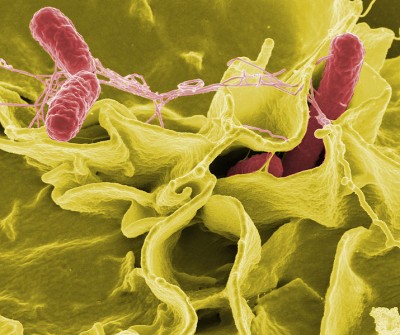From the press release from the Buncombe County Department of Health:
 |
| Color-enhanced scanning electron micrograph showing Salmonella typhimurium (red) invading cultured human cells Credit: Rocky Mountain Laboratories, NIAID, NIH |
The Buncombe County Department of Health is currently investigating an outbreak of Salmonella Paratyphi B infection in Buncombe County. Communicable Disease Nurses and Environmental Health Specialists are conducting interviews with people who currently have or have had the infection, reviewing laboratory reports and inspecting food sources that may be linked to the outbreak. Communicable disease experts from the NC Division of Public Health and the Centers for Disease Control and Prevention as well as food specialists from the NC Department of Agriculture are assisting with the investigations. As of this morning, 27 possible cases have been identified and the source of contamination has not yet been confirmed. All cases appear to have been associated with residence or travel to Buncombe County since February 28, 2012. Any reports of possible additional cases are immediately placed under investigation to verify whether the case may be linked to this outbreak.
Currently, Buncombe County Department of Health is working with all known infected individuals and is implementing control measures to further prevent transmission of the disease. Businesses and infected individuals are cooperating with local health officials to aid in investigation and control of the outbreak. A Hotline will be operational after 1:00 pm today to offer people a way to call for accurate information about this outbreak. The Hotline 828.250.5300 will have an automated message and a phone number for people with symptoms to talk with a Communicable Disease Nurse. Information is also available on the buncombecounty.gov website.
Salmonella is a “family” of bacteria and different types of Salmonella cause slightly different symptoms, including onset and severity, method of transmission and how long someone is contagious. Lab reports indicate that the salmonella type associated with this outbreak is unique and has a genetic fingerprint that is not common.
Salmonella Paratyphi B, found in the intestines of humans, can be spread from person to person or by eating food or water contaminated with the feces of a person ill with Salmonella Paratyphi B infection or a person who carries this infection in their body.
Any food can become contaminated at any point in the food chain, including at home or in restaurants. Contamination can occur when a person infected with Salmonella Paratyphi B handles food and does not wash their hands well after using the bathroom. Food can also become contaminated if cutting boards or counters are used to prepare contaminated foods and are not disinfected before preparing food that doesn’t get cooked, such as salads or fresh fruits.
The best ways to prevent Salmonella infection are:
• Good hand washing: wash hands after using the toilet or changing a diaper; or before you fix, serve or eat food.
• Cook all foods fully and as directed to kill germs.
• Keep uncooked meats, poultry and eggs away from fruits and vegetables, cooked foods and ready-to-eat foods.
• Wash counters, cutting boards and utensils with soap and water after they have been in contact with raw meat, poultry or eggs.
• Rinse all fruits and vegetables with running water before you eat them.Symptoms of Salmonella Paratyphi B usually begin about 6 days after exposure but may not begin for as long as 30 days. Symptoms may include gradual onset of high fever and fatigue, headache, loss of appetite, diarrhea (sometimes bloody), and stomach pain, and usually last between 4 and 7 days. Antibiotics are used to treat this type of Salmonella.
The elderly, infants and those with a compromised immune system can become seriously ill and may need to be hospitalized.
Recommendations for anyone who has symptoms of Salmonella Paratyphi B infection include:
• See a doctor immediately
• Do not prepare food or drinks for others until a doctor tells you it is safe for you to do so
• Do not go to work or school until you no longer have diarrhea
• If you are a food worker, health care worker or child care worker, do not return to work until released by the Buncombe County Health Director
• Drink plenty of water and juice
• Call your doctor or go the emergency room if you are unable to keep down liquids or have signs of dehydration (dark urine, small amount of urine, or a rapid heart rate)
• Call the Buncombe County Department of Health Disease Control Division at 250-5109 to report possible Salmonella Paratyphi B infection.For more information please contact Buncombe County Department of Health by calling the HOTLINE 828.2505300 or www.buncombecounty.org/health .



Before you comment
The comments section is here to provide a platform for civil dialogue on the issues we face together as a local community. Xpress is committed to offering this platform for all voices, but when the tone of the discussion gets nasty or strays off topic, we believe many people choose not to participate. Xpress editors are determined to moderate comments to ensure a constructive interchange is maintained. All comments judged not to be in keeping with the spirit of civil discourse will be removed and repeat violators will be banned. See here for our terms of service. Thank you for being part of this effort to promote respectful discussion.